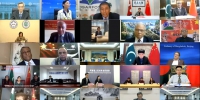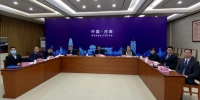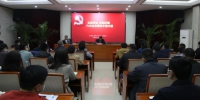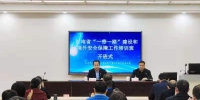全国首届外交话语及外事外交翻译研讨会暨首届外事外交翻译大赛通知
29.09.2017 23:25
本文来源: 人民政府外事侨务办公室
本届研讨会旨在紧密对接国家战略,搭建外交话语及翻译学术交流平台,构建融通中外的话语体系,为“一带一路”建设和国家总体外交提供语言服务和政策咨询,并积极探索和创建外交语言及外事外交翻译研究的学科方向。会议将邀请国内外知名专家做主旨发言,进行高端学术交流、研讨活动。
会议期间还将举行全国首届外事外交翻译大赛颁奖典礼( 全国首届外事外交翻译大赛参赛规则 )和 “中国外事外交翻译与生态翻译学会”成立仪式。
一、组织机构
1.支持单位:中国翻译协会、中国翻译研究院
2.主办单位:中国翻译协会对外话语体系研究委员会、河南省人民政府外事侨务办公室、《中国翻译》杂志社、国际生态翻译学研究会、河南省翻译协会、郑州大学
2.承办单位:郑州大学外语学院、中国外事外交翻译与生态翻译学会(筹)、郑州大学中国外交话语研究中心
3.协办单位:亚太国际交流英语研究会
二、会议主题
外交话语及外事外交翻译的科学研究与学科构建:定位·融合·创新
三、会议主要议题(但不限于下列)
1.外交语言、外交话语研究现状、问题与前景
2.外交语言的特征、范畴、类别和功能
3.“外交语言学/外交话语学”:立论与议题设置
4.外交语言的跨界研究与学科建设
5.外交语言的理论与实践创新
6.外交修辞与外交语言艺术
7.中国特色外交话语的构建、翻译与传播
8.“外交翻译学”:立论与议题设置
9.外交翻译的跨界研究与学科建设
10.外交翻译的理论与实践创新
11. 中央外交文献翻译与融通中外话语体系建设
12.中国特色大国外交话语体系建设的路径选择
13.“一带一路”外交话语体系建设
14.“讲好中国特色大国外交故事”的话语模式与翻译路径
15.外交话语的跨文化构建
16.外事外交高端翻译人才培养
17.外交翻译技术与信息化建设
四、会议时间和地点
1. 时间:2017年12月16-17日(星期六至星期日)。15日(星期五)报到。
2. 地点:河南省郑州市高新区科学大道100号,郑州大学(主校区)。
五、联系方式
会务组邮箱: [email protected]
联系人:刘永杰13298365310,杨明星15139795599,张庆彬15803818871
详情请关注郑州大学外语学院网站: http://www5.zzu.edu.cn/fld/ ,郑州大学中国外交话语研究中心网站: http://www5.zzu.edu.cn/cdd/ 中国译协网站: http://www.tac-online.org.cn/
全国首届外交话语及外事外交翻译研会组委会
郑州大学外语学院
2017年9月27日 全国首届 外事外交翻译大赛 参赛规则 为推动中国外事外交翻译事业的发展,选拔并培养高端外事翻译人才,发挥翻译在助推“一带一路”建设、构建融通中外话语体系中的沟通桥梁作用,讲好中国故事、传播好中国声音,提升中国对外形象和国际影响力,特举办全国首届外事外交翻译大赛(笔译),具体参赛规则通告如下:
1.本届竞赛分别设立英译汉和汉译英两个奖项,参赛者任选其中一项参加。
2.参赛者年龄:参赛者年龄须在45岁以下(1972年1月1日后出生)。
3.参赛译文须独立完成,杜绝抄袭现象,一经发现,将取消参赛资格。请参赛者在大赛截稿之日前妥善保存参赛译文,请勿在书报刊、网络等任何媒体公布自己的参赛译文,否则将被取消参赛资格并承担由此造成的一切后果。
4.参赛译文和参赛报名表格式要求:参赛译文应为微软WORD电子文档,中文宋体、英文Times New Roman字体,全文小四号字,1.5倍行距,文档命名格式为“XXX(姓名)英译汉”或“XXX(姓名)汉译英”。参赛报名表文档命名格式为“XXX(姓名)英译汉参赛报名表”或“XXX(姓名)汉译英参赛报名表”。译文正文内请勿书写译者姓名、地址等任何个人信息,否则将被视为无效译文。每项参赛译文一稿有效,恕不接收修改稿。
5.参赛方式及截稿日期:请参赛者于2017年11月30日(含)前将参赛译文及参赛报名表以电子文档附件形式发送至[email protected],发送成功的文档得到自动回复后,请勿重复发送。本届竞赛不接收打印稿。
6.大赛将成立评委会,组织专家按照公平、公开、公正的原则对作品进行评审。
7.本届竞赛设一、二、三等奖和优秀奖若干名。本届竞赛颁奖典礼将于2017年12月16日(星期六)在郑州大学主校区(河南省郑州市高新区科学大道100号)举行,竞赛获奖者将获邀参加颁奖典礼。
8.竞赛报名表及竞赛原文:郑州大学外语学院网站: http://www5.zzu.edu.cn/fld/ ,郑州大学中国外交话语研究中心网站: http://www5.zzu.edu.cn/cdd/
9. 联系人:刘永杰13298365310,杨明星15139795599,张庆彬15803818871
10.参赛选手请填写《首届全国外事外交翻译大赛选手信息表》 (点击下载 )
首届外事外交翻译大赛汉译英试题 (以下汉语原文节选自《光明日报》2016年6月13日社会周刊·理论·实践版张颖的文章《中国对非外交新理念及话语体系的构建》。作者单位:北京外国语大学国际关系学院)
中国对非外交新理念及话语体系的构建 “志合者,不以山海为远。”作为世界上重要的国际关系之一,中国与非洲虽然远隔重洋,文化差异巨大,但双边关系却源远流长,中非关系在中非对外关系史中均占有重要地位。党的十八大以来,习近平主席积极倡导和推动对非外交,强调加强同非洲国家的团结合作是中国外交政策的重要基石。他先后两次出访非洲,提出“中非命运共同体”“正确的义利观”“真、实、亲、诚”等对非外交新理念,为中非全面战略合作伙伴关系提供了清晰的战略指引和思想动力,构建了全新的中国对非话语体系。 “命运共同体” 2013年初,习近平主席在访非期间首次提出中非是“命运共同体”。他指出,中非关系如同“兄弟情谊”,有“共同的历史遭遇、共同的发展任务、共同的战略利益”,双方互视对方的发展为自己的机遇,通过加强合作促进共同发展繁荣。他表示,新中国成立以来,中非老一辈政治家共同开启了中非关系新纪元。双方在支持反殖反帝、争取民族独立和解放、实现和平与发展的道路上,“结下了同呼吸、共命运、心连心的兄弟情谊”。
中非“命运共同体”理念的提出,将中非的历史命运与现实命运交织在一起,确认了中非友好的历史传承,点明了双方的价值观认同,拉近了双方关系,成为中国对非话语体系的重要内容和发展中非关系的感情纽带。 “正确义利观”与“共同发展”“合作共赢” 党的十八大以来,习近平主席从“正确义利观”的角度对中非相互平等和互利合作进行了阐释。他在2013年访非期间提出,要以正确的义利观为指导,加强与发展中国家的务实合作。他强调,对包括非洲在内的广大发展中国家,一定要坚持正确义利观。只有坚持正确义利观,才能把工作做好、做到人的心里去。政治上要秉持公道正义,坚持平等相待,遵守国际关系基本原则,反对霸权主义和强权政治,反对为一己之私损害他人利益、破坏地区和平稳定。经济上要坚持互利共赢、共同发展。对那些长期对华友好而自身发展任务艰巨的周边和发展中国家,要更多考虑对方利益,不要损人利己、以邻为壑。正确义利观是中国对发展中国家外交的一面旗帜,讲求的是义利相兼、以义为先、情义为重,核心要义是把帮助非洲等发展中国家实现自主可持续发展同促进中国自身的发展紧密结合起来,实现合作共赢、共同发展,推动世界更加均衡、包容和可持续发展。
长期以来,中国在尊重主权、平等互利的基础上与非洲国家发展关系,在给非洲提供援助时严格尊重受援国的主权,不把自己的意志强加于人,绝不附带任何政治条件,绝不要求任何特殊权利,绝不干涉内政,在合作中出现的问题通过平等协商解决。 “真、实、亲、诚” 在中国外交的整体布局中,发展中国家是基础,非洲是“基础中的基础”。2013年习近平主席访非时,提出了“真、实、亲、诚”的对非外交新理念。“真”,就是在交往上真诚以待,“真朋友最可贵。中非传统友谊弥足珍贵,值得倍加珍惜。”“实”,就是在合作时真心实意,“中国不仅是合作共赢的倡导者,更是积极实践者。”“亲”,就是强调“中国人民和非洲人民有着天然的亲近感。”“诚”,就是在解决合作中出现的问题时,讲求实效,“中方坦诚面对中非关系面临的新情况新问题,对出现的问题,我们应该本着相互尊重、合作共赢的精神加以妥善解决”。
多年来,对非话语体系多为西方所主导,西方通过数百年对非洲的殖民,建立了一套强势的话语体系。而随着中非关系的发展,西方媒体利用话语权优势频频抛出“中国威胁论”,大肆宣扬所谓的中国对非洲实行“新殖民主义”“掠夺资源”,这些负面论调不仅严重影响了中国的形象,而且也阻碍了南南合作、南北关系的健康发展。习近平主席对非外交的理解与思考,构成了中国对非话语的独特内容和独创价值,改变了西方主导对非话语权的状况,实现了东西方话语优势的合理转换,在非洲产生了巨大影响和共鸣。
首届外事外交翻译大赛英译汉试题 (节选自Jonathan Holslag的论文“Challenges to China's Peaceful Rise,” Analysis ISPI, No.212, November 2013)
The case for peaceful development
China’s new leaders have made their case for peaceful development forcefully. The first main argument running through the discourses of the leadership is that their country’s development creates great opportunities and that globalization spreads them to all corners of the world. Mutually beneficial economic cooperation and trade, they posit, are advanced through a division of labour. No delegation passes by without Chinese interlocutors emphasizing the specialization in bilateral trade relations. During a visit to a China-ASEAN expo, Premier Li Keqiang stressed, for instance, that China and ASEAN were becoming “two wheels of regional and global trade rolling together”.
The second assertion is that China seeks to settle differences with other countries through multilateralism and that it is dedicated to help developing a more solid architecture of international organizations. Xi Jinping, for example, stressed his commitment to “safeguard and consolidate” multilateral cooperation. Decision-makers like to highlight that this engagement with multilateralism unfolded at various levels. Within the G-20 China plays a pivotal role in discussions about governing the new global order. In Asia it is involved in crafting open trade regimes and finding a solution to conflicts like the wrangling over the South China Sea or the Korean Peninsula. In Africa, Chinese envoys take pride in assisting the African Union in its labourious quest for regional stability, not the least by erecting its brand new headquarters.
Thirdly, Beijing asserts that war and coercion no longer pay off. It says to adhere to a strict policy of strategic self-restraint. A gesture of its benign intentions, Beijing concluded agreements with 12 neighbouring countries over the demarcation of tractions of its disputed land border. While continuing to signal its claims in the East and South China Seas, the Chinese government reiterated time and again that military muscle flexing offers no solution and that joint development of the abundant offshore resources could help overcome disputes. Mistrust about China using its economic clout to impel other countries into political concessions is also brushed away, as leaders stress that a rising power can only grow smoothly if it allows its partners to negotiate on an equal footing.
The most intriguing part of China’s narrating on peaceful development, is how it seeks to bridge the differences in interests between developing states that place the national interest above individual rights and developed countries that are expected to be more liberal. While sovereignty and national unity run as a red line throughout official statements, Chinese leaders also stress that people share universal aspirations, including their longing for personal freedom, while arguing that it takes a long process of economic development for them also to come into full bloom as universal values. By putting development first, the emphasis is on the process, which is one of convergence and the formation of a global society, rather than static differences among states. Chinese leaders have by and large recognized that there is a global trend of normative convergence, but also that it is up to states to make sure that this transpires in an orderly way.
Hence, as regards defence of peaceful development, the Chinese government has tapped at least into the right repertory of liberal if not idealist principles. It has gone even further to demonstrate that these principles are not just shrewd propaganda. On the one hand, it argues that there is no alternative to peaceful development. China’s growth is strongly interdependent with the economic success and development of other nations. A vast continental state that borders several other needy juggernauts, China cannot but foster a stable form of regional coexistence. On the other hand, leaders claim that there is no way back. China has become so deeply integrated into the global society that its captains of industry, opinion leaders, and officials already think very much like ‘responsible stakeholders’. As Cui Liru, President of the China Institute of Contemporary International Relations, put it: “Economic interlocking has given rise to a variety of communities with shared interests among nations”. The irreversibility of China’s peaceful rise is also said to result from a deep internalization of cooperative values, values that are drawn from both the recent experience of successful international cooperation and the historical legacy of mainly Confucian thought.
本文来源: 人民政府外事侨务办公室
29.09.2017 23:25
关于河南省外事系统先进集体和先进工作者拟表彰对象的公示
根据《河南省人力资源和社会保障厅 人民政府外事侨务办公室
河南将亮相纽约时报广场新年倒计时活动
本报讯(记者 沈剑奇)随着60秒人民政府外事侨务办公室
我省与阿根廷查科省签署友好合作关系备忘录
本报讯(记者 陈小平)12月16日,人民政府外事侨务办公室
为巩固新时代中巴友谊贡献河南力量
本报讯(记者 陈小平)12月9日,人民政府外事侨务办公室




